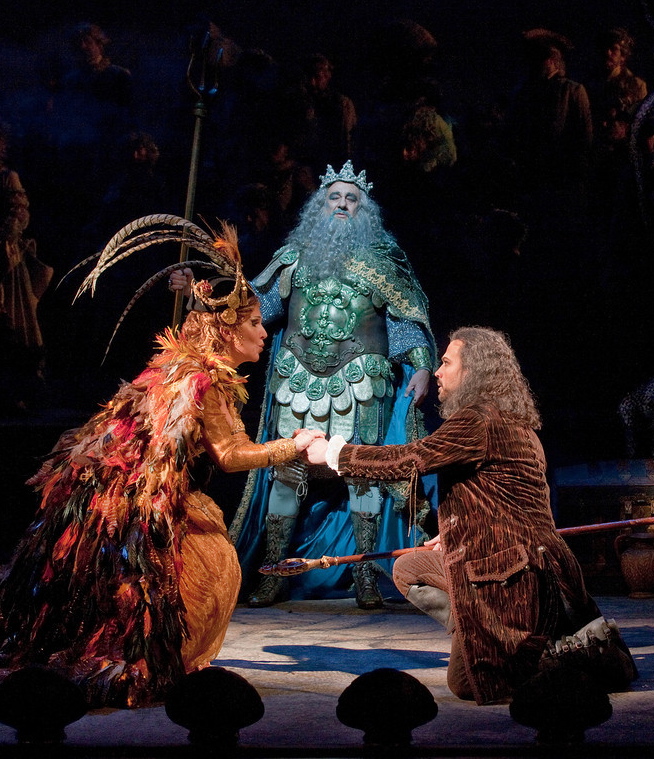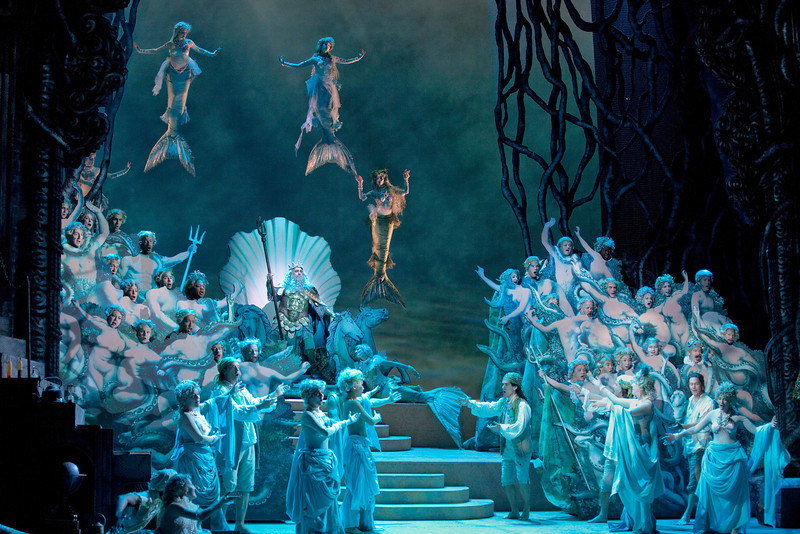Met’s strong cast and magical staging win out over PC cliches in “Enchanted Island”

Joyce DiDonato as Sycorax, Placido Domingo as Neptune, and David Daniels as Prospero in "The Enchanted Island." Photo: Ken Howard/Metropolitan Opera
The idea of freedom sets in motion The Enchanted Island, a Baroque pastiche that received its world premiere at the Metropolitan Opera on Saturday night. When the curtain rises, the sprite Ariel is in thrall to the magus Prospero, who promises Ariel his freedom if he will contrive a shipwreck that will bring Prospero’s daughter Miranda the husband that her father has chosen for her.
At the same time, that snippet of the plot shows just how vexed notions of freedom are in The Enchanted Island. Like colonialist readings of Shakespeare’s The Tempest, one of the sources for Jeremy Sams’ libretto, The Enchanted Island depicts Prospero as an arrogant European interloper in a foreign culture, an autocrat who defines “freedom” as exploiting the lives and powers of others for his own ends. And while The Enchanted Island itself epitomizes freedom—its glorious, motley score, assembled by Sams and musical advisor Ellen Rosand, dealing a welcome blow to Romantic fixations with “originality” and “genius”—its musical excellence and splendid stagecraft are undermined by a silly, clichéd libretto.
Spoken by Shakespeare’s Miranda, “O brave new world” glimmers with irony as she hails visitors from the old world. In Sams’ libretto, it is a catchphrase bandied about for cheap laughs. In Mozart’s Così fan tutte, a model for the inconstant castaways in The Enchanted Island, mutability springs largely unbidden from the dark mystery that is the human heart. The lovers in The Enchanted Island, instead, are puppets manipulated by magic spells and the mimed pulling of strings, and the ladies, predictably, get their turnabout-is-fair-play moment, singing “Men are fickle.”
The cosmic, providential forces at play in The Tempest are in The Enchanted Island reduced to mere trickery. Both Prospero and hoary Neptune are more blustery parents (“Do as I tell you!”) than embodiments of order and authority. And when Prospero at opera’s end surrenders his grimoire to the witch Sycorax, the gesture seems pointless, since he has acknowledged his supposed magic as “interference” and shown himself to be an impotent potentate, helpless without the labors of the native Ariel.
That said, its befuddled book aside, The Enchanted Island is an entertaining show. The unit set, by Julian Crouch, shows columns and capitals cluttered with books and intertwined with writhing vegetation—Inigo Jones meets The Lord of the Rings. Within this basic framework, lighting designer Brian MacDevitt and 59 Productions, the animation and projection team, conjure up marvels: glittery sprinkles of magic, ripples and heat and iridescent colors seemingly wrought by the characters’ song and, for Neptune’s manifestation, a dizzying journey through the deep replete with shimmering schools of fish.
The staging by Phelim McDermott has its low points (party streamers and balloons for Ariel’s failed abduction of Ferdinand, Busby Berkeley-style mermaids) and also great beauties: the hushed ending of Act I, when Prospero’s would-be magic staff glimmers weakly, a tiny light swallowed in the darkness.
While Prospero’s wizardry may be spent, the cast members of The Enchanted Island work their own powerful magic. As the witch Sycorax, absent in The Tempest but very much to the fore in this retelling of its tale, Joyce DiDonato begins her first aria Maybe soon, maybe now (its music drawn from Handel’s Teseo) with a thrilling messa di voce, makes the vowel in “soon” sound with the direst, most roiling colors, and seems to start her cadenza singing in the bass register. She transforms trills into fiery brands of rage and yet, as she cradles her heartbroken son Caliban, summons her customary clear-as-sunlight tones. The unsparing ferocity with which DiDonato digs into her music and probes beauties both ravishing and terrible is Callas-like — a comparison invoked often and too lightly but here one richly deserved.
As Neptune, Plácido Domingo faces the cringeworthy task of delivering a politically correct harangue (“You have stolen the land”) to Prospero at opera’s end. No matter: in the restricted range in which he now sings, his voice retains its inimitable strength and burnished beauty. And who else singing today could plausibly impersonate a god?
Time has begun to hollow and fray David Daniel’s once opaline timbre, but his artistry and musicianship are sterling. He is at his best in Prospero’s introspective musings (Chaos, confusion) at the end of Act I and in his plea to Sycorax for forgiveness, both drawn from Handel.
As Ariel, Danielle de Niese is a veritable whirlwind of charm and impertinence, bringing comic fizz to every scene in which she appears. She sings two of the show’s most wickedly demanding arias—I can conjure you fire and Can you feel the heavens are reeling (to music by Handel and Vivaldi, respectively)—with triumphant aplomb and a sometimes shrill soubrette voice.
Luca Pisaroni’s dark, handsome sound and dramatic command make up for those rare moments in the lowest reaches of Caliban’s music where his voice weakens. Lisette Oropesa’s pliant, luminous tone makes much of Miranda’s music; she deserves better direction than she receives in this production, in which Miranda is little more than a daffy marionette. An exquisite use of light and shade, ease in treacherous intervals, and a bright, almost girlish sound makes the countertenor Anthony Roth Costanzo’s one aria (Ferdinand’s Gliding onwards) a highlight of the evening.
Layla Claire (Helena) has a voice of liquid and lambent beauty that she puts to soulful use, most memorably in Why am I living? The tenor Paul Appleby (Demetrius), the baritone Elliot Madore (Lysander), and the mezzo Elizabeth DeShong (Hermia) sing well and hold their own among the vocal giants in the cast, as do the young masque singers (Ashley Emerson, Monica Yunus, Philippe Castagner, and Tyler Simpson).
All of the cast members enunciate clearly thanks to English coach Erie Mills and are splendidly clothed by costume designer Kevin Pollard. The Metropolitan Opera Orchestra under William Christie do themselves glory with alert, graceful playing throughout, best in the restless accompaniment to Miranda’s first aria and the raunchy, wildly scored dance music by Rameau and Jean-Féry Rebel that underpins Graciela Daniele’s witty choreography.
Drown the book (to paraphrase Prospero), but do make a journey to see and hear the wonders of singing and stagecraft in The Enchanted Island.
The Enchanted Island runs through January 30, and will be shown at movie theaters as part of the Live in HD series on January 21, with encore showings in the United States (February 8) and Canada (March 3 and 26). metoperafamily.org; 212-362-6000.

Photo: Ken Howard/Metropolitan Opera
Posted Jan 01, 2012 at 10:17 pm by Scott
Terribly bitter and lacking review. Placido’s range is far from limited, and Daniels’ voice timbre has more colors than ever. It’s amazing how reviewers can’t seem to grasp the idea that opera is an ART FORM that is alway evolving within it’s conceptual period. This reviewer must be a failed musician.
Posted Jan 21, 2012 at 6:12 pm by Dr John Wilkes
Just to report that I saw this production earlier this evening at the Cambridge Arts Theatre where a full house, many of whom are opera enthusiasts, received it with acclaim. The general view was that the quality of the singing and orchestral playing, plus the remarkable stage effects, combined to give immense pleasure. Anyone lucky enough to be in New York should ignore the snobbish, mean-spirited reviews and go to the Met, One particular felicity was the use of the opening of Zadok to Priest to herald Placido Domingo (who else) and there were many more. Of course it was not The Tempest, or the Midsummer Nigh’s Dream for that matter, but who cares. Bravo, to all concerned.
“Dr John”
Posted Jan 22, 2012 at 7:59 am by Claire
I’d agree with the above comment. If Placido does not now sound as he did when he debuted, it is to be expected. Voices evolve and notes are gained where some are lost, timbres change and there isn’t much we can do about it. I find it impressive he continues singing at the Met, and continues to do so as well as he’s ever done. It’s few voices that can be said for.
As to Ariel, at no point did she sound shrill to me. Her technique and accuracy were commendable. Treated as an extended musical joke with the audience, and Baroque music was full of these, it really was a treat to listen to.
Posted Jan 27, 2012 at 6:56 pm by Ursula Hahn
The reviews culled from The Opera Critic also indicate how important it is not to shoot from the hip right after a performance has ended and that one needs time for reflection, ideally to see and hear a work twice, to render judgement. None of the reviewers mentioned the performance in which Roth Costanzo took over for Daniels and the performance in which the latter didn’t sing at all, obviously because of indisposition. Listeners are spoiled by the technical manipulations used for CD recordings, can’t understand that singers are human and that the latter active during the “golden age” did not produce miracles in every performance.
Posted Feb 08, 2012 at 11:25 pm by Michael O'Steen
I just saw the encore HD showing and am a new lover of opera. If I appreciated productions as little as opera critics do I wouldn’t have become even an opera goer let alone a new fan.
This “critique” has absolutely no validity. Once “Cossi Fan Tutti” was referenced instead of “A Midsummer……..) as the second story inspiration I heard a big grain of salt hit my laptop.
It always seems that imperfection in art conjures bitterness and “snark” in critics. Is perfection attainable? Only in the imaginations and inflated memories of the reviewers.
It is such a shame that perfection can only be perceived or designed by those writers who have not the talent to partake in the creation of the art itself.
Finally, I once heard it said years ago amidst a poor New York Mets season, “It’s a shame all the best major league baseball managers are stuck driving taxis.”
Posted Feb 12, 2012 at 11:03 pm by Peter
I thought Elizabeth De Shong was a star of the show too. What a fantastic voice.
Posted Feb 16, 2012 at 3:37 am by Yvonne Thompson
Saw this in HD in Melbourne, Australia, today and if The Met ever thought it was a gamble producing this piece it was a gamble which certainly paid off. As usual The Met can assemble absolutely the right artists with the duel skills in singing and acting. The Melbourne audience loved it and applauded at the end. I would not attempt to praise one voice over another but for the ability to move you nearly to tears Luca Pisaroni would be hard to fault. What is stunning about The Met is that along with the beautiful established singers there is the next generation already in full flight particularly in this production. Thank you for putting this on film. We are so loving every performance we see.